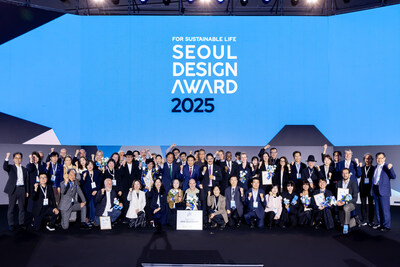Seoul Design Award 2025 Certifies Sustainable and Innovative Design Projects
SEOUL, South Korea, Nov. 13, 2025 /PRNewswire/ -- The 'Seoul Design Award 2025,' hosted by the Seoul Metropolitan Government and the Seoul Design Foundation, was successfully held at the Dongdaemun Design Plaza (DDP) on October 24. Now in its sixth year, the Seoul Design Award is the world's only international design award specializing in social impact. The award highlights practical design solutions addressing various challenges faced by humanity in the quest for sustainable living such as the climate crisis, social inequality, and environmental destruction. The award ceremony recognized outstanding projects this year and was held as a global design award opening the door to a sustainable future.
- Four Major Themes Towards Sustainability
The Seoul Design Award is well-known for selecting designs that promote sustainable life for people and communities, rather than focusing solely on shape or technology.
This year, based on the UN Sustainable Development Goals (SDGs), the competition focused on four themes: Health and Peace, Equal Opportunities (Universal Design), Energy and Environment (Upcycling Design), and Cities and Communities. Approximately 1,000 projects from 74 countries worldwide competed from March to June.
- Global Judging Combining Expertise and Fairness Drove Participation
This year's panel of juries was composed of 32 global design experts from 21 countries as well as design leaders from across diverse fields. Strictly abiding by principles of fairness, the juries selected a total of 60 award-winning projects (from approximately 30 countries).
Notably, the award was further distinguished as the world's only 'participatory design award' through the participation of global citizens who voted for the Grand Prize.
Top 10 awardees from 10 countries were invited to Seoul for the 'Top 10 Live Competition,' where they presented their projects in person to compete for the Grand Prize.
Over 5,500 global citizens from 48 countries participated in the online voting to help select the Grand Prize winner from among 10 projects. This online voting and the in-person selection on-site by the panel of 12 international jury members helped determine the Grand Prize Winner.
During the award ceremony, awardees received trophies, certificates, prize money totaling KRW 150 million, as well as networking opportunities with designers and international experts in the field of sustainability.
- Grand Prize Winner: 'Jaza Energy Hubs' — Design Working to Solve Energy Inequality
This year's Grand Prize was awarded to Nonfiction Design (USA-Nigeria)'s 'Jaza Energy Hubs.'
This project is an innovative model that addresses energy inequality in rural Nigeria by establishing solar power hubs and a rechargeable battery sharing system.
Notably, it created local self-reliance and economic opportunities through a system where women operators manage the hubs.
"Design is not about technology; it is a process of building dignity and self-reliance.
It is deeply meaningful that the Seoul Design Award precisely understood and recognized this value."
— Mardis Bagley, Nonfiction Design
- The New Standard in 'Sustainable Design' That Captured the World's Attention
This year's juries emphasized that "sustainability is not an ideal for the future, but a practice that must be implemented immediately."
Ezio Manzini, President of the DESIS Network, an expert in solving social problems through design, stated, "Problem-solving begins not with external technology, but through a relational process where local residents take the lead." He thus identified 'relational design' as the keyword of this year's winning projects.
Andrea Cancellato, Director of the ADI Design Museum in Milan and an expert in Italian design museum operations, assessed, "The Seoul Design Award commemorates 'design in action' and has firmly demonstrated its practical value on the international stage."
Martin Zelger, CEO of DAAily Platforms which operates renowned design media like Designboom, added, "This year's projects demonstrated a power that transcends mere aesthetic perfection, driving empathy and social transformation, proving that the sincerity of design surpasses human values."
The nine awardees participating in the Top10 Competition are:
- From Finland: 'Alusta Pavilion,' a multi-species ecological pavilion where humans, plants, and animals coexist,
- From Italy: Anako's 'Emergency Folding Cradle,' an emergency cradle for vulnerable groups like mothers and children in crisis situations,
- From Australia: 'Crafted Liberation,' a project restoring women's rights to public spaces through chairs upcycled from hijabs,
- From China: 'Desert Ark,' a sustainable 3D-printed housing experiment for desert cities,
- From India: 'Golden Feathers,' a circular project upcycling feather waste into natural wool fibers,
- From South Korea: 'LADIS_LAmp DISinfection', a portable drinking water sterilizer reducing disease in diverse environments,
- From Denmark: 'Soft Solids Lighting,' a sustainable lighting design project reducing waste through upcycled products,
- From Taiwan: 'The Borrowing Project,' a modular standard building material borrowing system practicing resource circulation,
- From Mexico: 'The City of Indigenous Arts,' a cultural city integration and regeneration project reborn as an exhibition ecosystem showcasing community heritage and art,
The two Concept Award winners are:
- 'Bark-Code' from the UK and South Korea, a 3D bark scanner providing growth and carbon sequestration data,
- 'Blue Garden' from Italy, a modular coastal installation utilizing discarded seashells.
All award-winning projects share a common emphasis: not only technology but relationships, not only the environment but coexistence, not only cities but communities.
- 2026, 'Design in Action for a Sustainable Future'
Oh Hwan Jong, a TOP 10 Awardee, deeply resonated with the award's role and values, stating, "Design is not merely about creating beauty; it is about protecting human dignity and life. The Seoul Design Award was an opportunity to have that authenticity recognized and shared with the world, and I want to challenge myself again."
Cha Kang Heui, CEO of the Seoul Design Foundation, stated, "The Seoul Design Award will continue to evolve as a platform to spread global design practices for sustainable living. We hope more designers will join us in building a sustainable future through the stage the award provides."
The 2026 Seoul Design Award will begin its seventh journey in March, reaffirming its position as a global hub for sustainable design. Any designer involved in a sustainable project can apply, regardless of whether they are affiliated with a company or are an individual. Any designer can aim for the honor of winning the Grand Prize at the award ceremony in October.
The winning projects and information about the Seoul Design Award can be found at: www.seouldesignaward.or.kr.
![]() View original content to download multimedia:https://www.prnewswire.com/apac/news-releases/seoul-design-award-2025-certifies-sustainable-and-innovative-design-projects-302614605.html
View original content to download multimedia:https://www.prnewswire.com/apac/news-releases/seoul-design-award-2025-certifies-sustainable-and-innovative-design-projects-302614605.html
SOURCE Seoul Design Foundation


